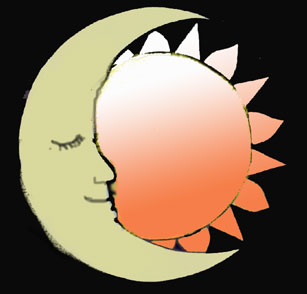Weekday names
Latin names for deities were not usually used for English weekdays, with the exception of Saturday (Saturn). The Latin days of the week were named as follows, with the god for which they were named in brackets:
- Solis dies (Sun)
- Lunae dies (Moon)
- Martis dies (Mars)
- Mercurii dies (Mercury)
- Jovis dies(Jove)
- Veneris dies (Venus)
- Saturni dies (Saturn)
European Latin languages - French, Italian, Spanish, Portuguese - tend to follow the Latin names, whereas English uses the northern European forms of the names of deities. The Nordic/ Northern European gods tend to have the same attributes as the Roman gods who share the same days.
Sunday and Monday
The sun and moon have always been the most visible planetary bodies, with great significance for all the cycles of human life. Hence, their place in the nmaes of the first two days of the week hardly needs explanation. Their attributes are obvious.
Sunday is traditionally the first (or last) day of the week. As a day of rest from work, it is the most religiously significant day of the week. Hence, it takes its name from the central god of pre-Christian mythologies - the Sun. This word is basically the same in the Northern European langauages with Nordic/Germanic roots. (German: Sontag; Dutch: Zondag; Swedish: Sondag; Danish: Sondag). Due to the influence of Christianity, the Latin languages tend to have the replaced the Latin name for the Sun with a reference to the Christian "God" or "lord" - dimanche (French); domenica(Italian); domingo (Spanish and Portuguese).
There is less variation in the names used for Monday - all major North and South European languages refer to the Moon. In northern Europe the name is one of the spellings of "Mon," as in the German Montag. (Maandag in Dutch; Mandag in Swedish and Danish with various accents The Latin languages use the "lun" root, eg. French lundi Even Welsh and Irish Gealic refer to dydd Llun and de Luan
Saturday
Saturn was the Roman deity of agriculture. (Wikipedia and Encarta) The most interesting attribute of Saturn was the festival associated with him, the Saturnalia, the seven-day period around the time of the Roman midwinter festival (17th December) when gifts were given and normal roles were reversed, so that masters served their slaves.